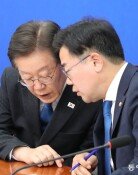Foreign Policy Experts War Game Assuming North Korean Crisis Scenarios
Foreign Policy Experts War Game Assuming North Korean Crisis Scenarios
Posted June. 09, 2005 06:22,
The latest issue (July/August 2005) of The Atlantic, a U.S. current affairs magazine, asked six foreign policy strategists to conduct mock wargames assuming a North Korean nuclear crisis. The six strategists took roles of officials of major agencies such as the National Security Council (NSC), the equivalent of South Koreas permanent committee of the NSC.
The wargames started with a briefing using PowerPoint by a commanding officer of the Pacific theater.
Chief of staff:
We are militarily at a much greater advantage. In case of a war, brutal killing will occur. But we will win, much faster than we did in the Iraq war.
Commanding Officer of the Pacific Theater:
The two desirable ways to victory are rapid attack and decisive victory. The problem is that a great deal of chemical weapons and missiles are hidden underground. The success of defending Seoul will be decided during the first few days of the war. First of all, we have to attack chemical weapons, missiles and nuclear facilities. In Iraq, some fighter planes made about 800 sorties a day, but this time, 4,000 sorties a day will be needed.
Director of NID (National Intelligence Department):
We cannot defend Seoul. At best, we can fight a delaying action for at least 24 to 48 hours. There are hundreds of thousands of U.S. citizens as well as 10 million Koreans in Seoul.
Chief of staff:
I think we can keep the number of casualties to minimum either by launching a preemptive attack or counterattacking.
Director of NID:
What do you mean by minimum? One or two hundred thousand?
Chief of staff: One hundred thousand, possibly.
Director of the CIA (Central Intelligence Agency): The biggest difference between the year 1950 and now is that North Korea has 1 to 10 nuclear weapons.
Chief of staff: We can defeat the North before it fires missiles.
Commanding Officer of the Pacific: The more nuclear weapons Pyongyang has, the more difficult it will be to secure targets. Within 12-18 months, we have to prepare for a preemptive attack against the North or a planned regime change.
Chief of staff: We can lend nuclear weapons to South Korea and Japan. We have to publicly declare that we will move fighter jets equipped with nuclear weapons and missiles to Guam.
Director of NID: That may result in Japan going nuclear.
Director of CIA: There are different opinions. It is better to move on to other subjects.
Commanding officer of the Pacific: Where should we draw the red line?
Secretary of State: The export of nuclear materials.
Commanding officer of the Pacific: All I can say is that we will not sit idle patiently. We will act.
Secretary of State: In order to end the regime of the North, we will use military force immediately or later.
Chief of staff: We have to tell North Korea that it will be a target if a nuclear bomb or whatever goes off, even when it is not clear it is the work of the North.
Secretary of State: The idea of attacking the North without solid evidence is not characteristic of the U.S.
Commanding officer of the Pacific: If the regime of Kim Jong Il collapses, a lot of refugees will go to South Korea or China. Under the situation, dispersal of chemical weapons will cause enormous tragedy.
Secretary of Defense: Winning the lottery usually leads to worries about taxes.
Director of CIA: If only you are ready
Commanding officer of the Pacific: Considering the population of the North of 23 million, a 500,000-strong military force is necessary in order to keep social security and prevent plunder.
Director of CIA : The collapse of a country armed with nuclear, biological, and chemical weapons poses a serious threat to the world. Considering that, the Iraq war is not a big deal.
Commanding officer of the Pacific: Please sum up recommendations to President.
Director of CIA: First, it is important to step up diplomatic efforts. Sincere diplomatic measures are urgently needed. We have to have reliable information.
Director of NID: We should be convinced 100 percent that all diplomatic efforts are exhausted before carrying out a preemptive attack. Otherwise, we cannot win support from the international community.
Secretary of Defense: The problem is we never know whether diplomatic efforts have failed or not.
klimt@donga.com
Headline News
- Pyongyang’s trash provocation makes Seoul consider loudspeaker broadcasting
- Two Korean Americans win prizes at Queen Elisabeth Competition
- Tech firms including Google, Intel form anti-Nvidia frontline
- Biden suggests cease-fire plan to end war
- Kim Woo-min wins gold in men’s 400m freestyle in personal best time







